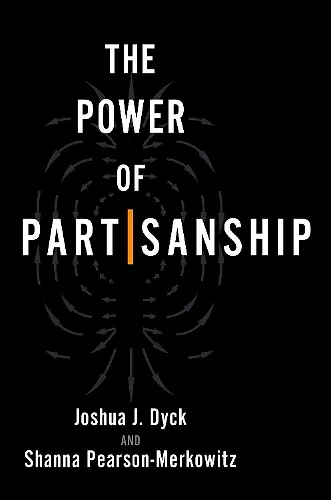The Power of Partisanship
Joshua J Dyck author Shanna Pearson-Merkowitz author
Format:Paperback
Publisher:Oxford University Press Inc
Published:28th Sep '23
Should be back in stock very soon
This paperback is available in another edition too:
- Hardback£68.00(9780197623787)

In The Power of Partisanship, Joshua J. Dyck and Shanna Pearson-Merkowitz argue that the growth in partisan polarization in the United States, and the resulting negativity voters feel towards their respective opposition party, has far-reaching effects on how Americans behave both inside and outside the realm of politics. In fact, no area of social life in the United States is safe from partisan influence. As a result of changes in the media landscape and decades of political polarization, voters are stronger partisans than in the past and are more likely to view the opposition party with a combination of confusion, disdain, and outright hostility. Yet, little of this hostility is grounded in specific policy preferences. Even ideology lacks meaning in the United States: conservative and liberal are what Republicans and Democrats have labeled "conservative" and "liberal." Dyck and Pearson-Merkowitz show how partisanship influences the electorate's support for democratic norms, willingness to engage in risk related to financial and healthcare decisions, interracial interactions, and previously non-political decisions like what we like to eat for dinner. Partisanship prevents people from learning from their interactions with friends or the realities of their neighborhoods, and even makes them oblivious to their own economic hardship. The intensity and pervasiveness of partisanship in politics today has resulted in "political knowledge" becoming an endogenous feature of strong partisanship and a poor proxy for anything but partisan behavior. Dyck and Pearson-Merkowitz present evidence that pure independents are, in fact, very responsive to information because they are not biased by partisan elite cues and important and relevant political information is often local, contextual, and personal. Drawing on a series of original surveys and experiments conducted between 2014 and 2020, Dyck and Pearson-Merkowitz show how the dominance of partisanship as a decision cue has fundamentally transformed our understanding of both political and non-political behavior.
Dyck and Pearson-Merkowitz conduct a wide-ranging investigation into the effects of partisanship. Drawing on surveys and an array of other data, they show that partisanship and partisan cues shape attitudes, behaviors, and preferences across a huge range of domains, extending well beyond the political realm. This creative and thought-provoking study illuminates the drivers of growing affective polarization in society, as well as the challenges facing American democracy ahead. * Frances E. Lee, Professor of Politics and Public Affairs, Princeton University *
This book convincingly demonstrates how partisanship distorts our view of the world. Through a series of well-designed experiments, Dyck and Pearson-Merkowitz show how our responses to partisan signals affects everything from the politicians and policies we support to the foods we like. They also reveal how independent voters may be both more savvy than often portrayed and better able than partisans to realistically assess the world. This book is vital for those seeking to understand partisanship and its role in our political system. * Seth Masket, Professor of Political Science and Director of the Center on American Politics, University of Denver *
In this groundbreaking book, Dyck and Pearson-Merkowitz go beyond the well-tread domain of how partisanship affects politics to document how deep the influence of affective attachments to parties has become. The pair make two key contributions. First, they document that partisanship has become so toxic that the ameliorative power of positive intergroup contact—long thought to reduce intergroup animosity—has little impact on how we view out-partisans. Second, they question the value of measures of political knowledge. As what we know about politics has become endogenous to partisanship, the political science canon about how political knowledge affects political preferences becomes upended and in need of revision. A must-read for students of American politics today. * Alexandra Filindra, Associate Professor of Political Science and Psychology, University of Illinois Chicago *
This is an important cautionary tale, well supported by the authors' evidence... Highly recommended. Advanced undergraduates through faculty; professionals. * Choice *
This is an important cautionary tale, well supported by the authors' evidence. * Choice *
ISBN: 9780197623794
Dimensions: 236mm x 158mm x 16mm
Weight: 367g
256 pages